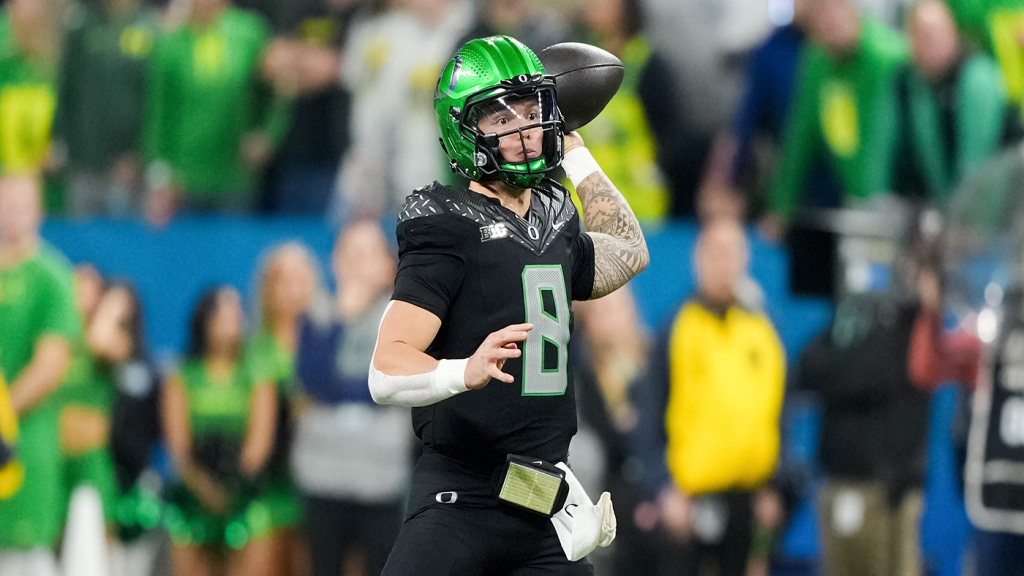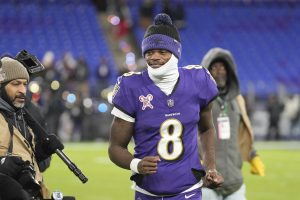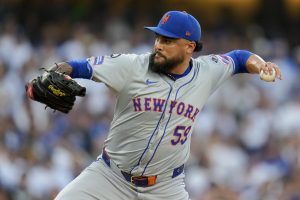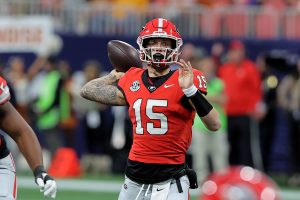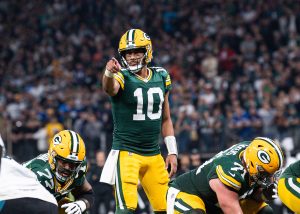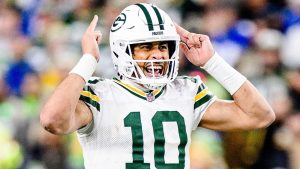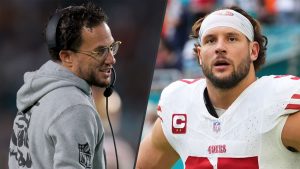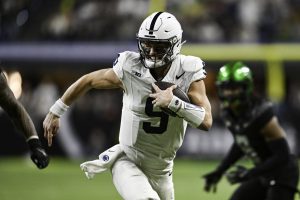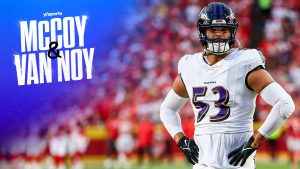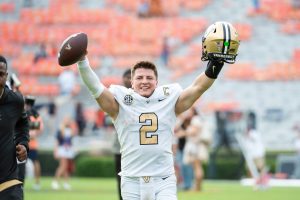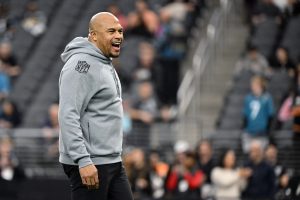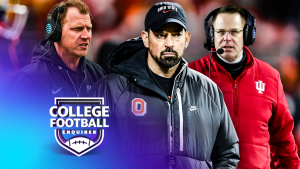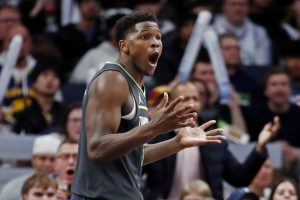How does the two-time national champion stack up as an NFL Draft prospect?
Getty Images
Dillon Gabriel is older than Anthony Richardson — you’ll read and hear that sentence often during the pre-draft process for the Oregon quarterback who’s also spent time as the Central Florida quarterback and Oklahoma quarterback in his career.
But a three-college career isn’t completely out of the ordinary in the modern portal-driven world of college football, and wherever Gabriel’s been, he’s won and produced at a high level. Entering the College Football Playoff, he’s played in 63 games with 153 touchdowns to 32 interceptions. Altogether, he has 186 touchdowns since beginning at Central Florida in 2019.
While the Ducks, the No. 1 team in the land, have their sights set on a national title, soon we’ll all be evaluating Gabriel as a draft prospect. How does he stack up? What are his strengths and weaknesses, and which teams would represent the best fit for the quarterback? Let’s dive in.
Prospect overview
We need to start where every NFL Draft prospect profile starts: the measurables. The combine will ultimately confirm or deny Gabriel’s height and weight, but he’s listed at 6-foot-0 and 200 pounds, although, frankly, he looks even shorter on film. Thankfully, the likes of Bryce Young, Baker Mayfield, and over a decade ago, Russell Wilson have paved the way for shorter quarterbacks to be picked early in the draft.
For apt perspective on Gabriel’s size, Brock Purdy measured in at nearly 6-1 and 212 pounds at the 2022 combine. By NFL size standards at the quarterback position, Gabriel is still quite small.
Then there’s, of course, the age factor, which is not dissimilar to what Georgia’s Stetson Bennett dealt with during his pre-draft process in 2023, although Gabriel isn’t quite as old as Bennett was as a prospect. He’ll turn 24 three days after Christmas, meaning he’ll turn 25 near the end of his rookie season in the NFL.
Do teams care about age anymore, in the post-COVID world, where all of college football got one full year of extra eligibility? It seems as though they don’t put as much credence into age as they used to, and it goes deeper at quarterback. Clubs seemingly are viewing older, more experienced passers in a better light thanks to the early-career successes of Jayden Daniels and Bo Nix and corresponding struggles for relative youngster Anthony Richardson.
And those 60-plus starts for Gabriel will almost assuredly be viewed as a positive on his profile, age be damned.
Strengths
Gabriel is patient in the pocket. It’s his clearest strength on film. Unlike the vast majority of quarterbacks in today’s game who flee at the first indication of pressure or when their first read is covered, Gabriel will stand and scan. It’s a lost art. Ask Tom Brady if it works. Entering the CFP, Gabriel was only pressured on 26.4% of his dropbacks. Related to that play style, Bennett is willing to glide through his progressions, and full-field reads are part of his game.
The Oregon offense is loaded with intricate screens but does feature “NFL-like” play-action bootlegs, so it’s not completely gimmicky where pro offensive coordinators won’t be able to find reps from Gabriel that will be translatable to what he’ll be asked to do in the NFL. And his pocket presence, thanks to his bouncy feet, improved as he progressed in college. That continuation will be imperative to his development at the next level.
When he needed to operate outside the pocket, Gabriel has proven to be capable. On those designed rollouts, he demonstrated surprising velocity while throwing on the run with quality. As evidenced by his 33 rushing touchdowns to date, Gabriel’s not always stationary in the pocket, either.
Gabriel’s accuracy is a plus, although I can’t label him as surgical with his ball placement. And that goes for all levels of the field, although just 10.5% of his attempts thus far have been 20-plus yards in the air. He’s mostly a short-to-intermediate level thrower.
Weaknesses
Gabriel’s arm is not atrocious. By NFL standards, it’ll be average on a good day, and slightly below-average on a bad one. There aren’t many times on film when he displayed the ability to really drive a ball through a closing window or stretch a defense vertically more than 25 yards. His tight, textbook, almost three-quarter release gets rid of the ball quickly, which helps alleviate some of the drawbacks of his weaker arm strength, but let’s just say Gabriel will not be asked to throw many out routes toward the sideline from the far hash or deep posts in the NFL. It will mostly be a limiting factor on him as a professional.
There’s some mobility to his game — although I can’t envision him making many NFL defenders miss in space or outrunning too many linebackers. Gabriel’s a rhythm thrower. When everything’s operating well within structure, almost all of his passes will be on time and to the correct receiver based on where coverage dictates he should throw the ball.
When that’s not the case, things can get ugly. Against Michigan State in October, Gabriel did complete 22 of 30 passes for 257 yards but threw two picks along with two touchdowns and his eight incompletions were mostly ghastly misses because he wasn’t able to calmly click through his reads from a clean pocket. Unfortunately too, I didn’t see a variety of anticipatory throws on film. He’s not a master in that area at this stage.
He’s simply not a plus physical specimen by today’s NFL standards. He also threw to a tremendous amount of wide-open receivers at Oregon in 2024, and his stats were buoyed by the spread/bootleg based scheme at Oregon. Ironically, Michigan State was the only contest to date for Gabriel in which he hit the 20-pass mark on throws that weren’t screens and were attempted at least 6 yards downfield.
NFL team fits
The best chance for Gabriel to succeed in the NFL is if he lands in a reasonably cushy situation — similar to what he was in Oklahoma and even more so, at Oregon — on a team with a reasonably sturdy offensive line and a YAC-based philosophy on offense, which is becoming more of the norm in the NFL. A head coach from the Kyle Shanahan coaching tree, which grows every offseason, would be ideal.
Of course, as a backup or QB3 to begin, teams like the Browns, Raiders, Giants, Vikings, 49ers, or even the Dolphins would be logical, soft landing spots.
As far as scheme, plenty of schemed-open quick-game opportunities, RPOs, a dedication to play-action rollouts, and digs underneath clearing vertical routes would be nice. The whole attack doesn’t have to be centered around dink and dunk, although the limited vertical ability from Gabriel has to be considered. Then again, a team isn’t likely to pick Gabriel and then construct its offense around him.
The idea with Gabriel in the NFL has to operate has to mostly reduce his physical impact on the game and lean into his deceptive quicks, progression-reading acumen, pocket-navigation skills, and hint of mobility.
Gabriel feels like a quarterback who could sneak onto Day 2 or be an early Day 3 selection, and the combine will have a sizable impact on when the Oregon passer is ultimately picked.
